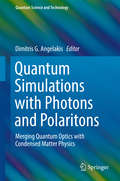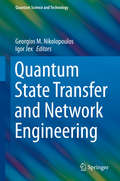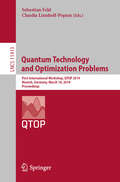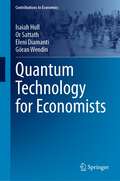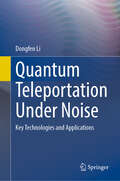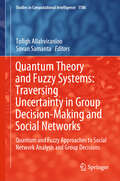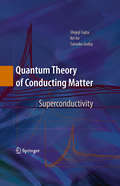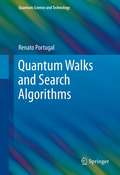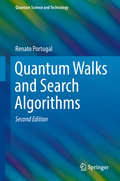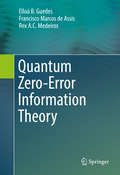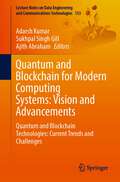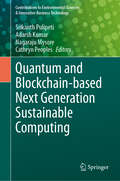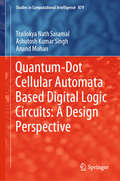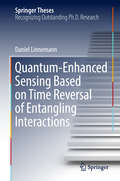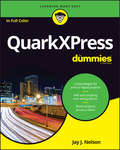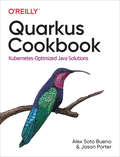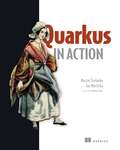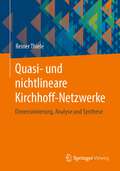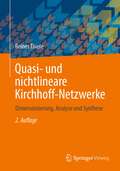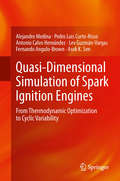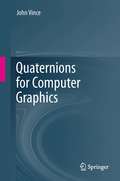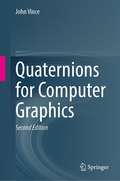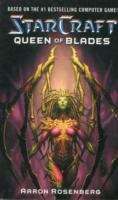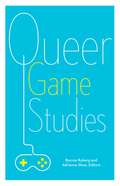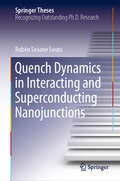- Table View
- List View
Quantum Simulations with Photons and Polaritons
by Dimitris G. AngelakisThis book reviews progress towards quantum simulators based on photonic and hybrid light-matter systems, covering theoretical proposals and recent experimental work. Quantum simulators are specially designed quantum computers. Their main aim is to simulate and understand complex and inaccessible quantum many-body phenomena found or predicted in condensed matter physics, materials science and exotic quantum field theories. Applications will include the engineering of smart materials, robust optical or electronic circuits, deciphering quantum chemistry and even the design of drugs. Technological developments in the fields of interfacing light and matter, especially in many-body quantum optics, have motivated recent proposals for quantum simulators based on strongly correlated photons and polaritons generated in hybrid light-matter systems. The latter have complementary strengths to cold atom and ion based simulators and they can probe for example out of equilibrium phenomena in a natural driven-dissipative setting. This book covers some of the most important works in this area reviewing the proposal for Mott transitions and Luttinger liquid physics with light, to simulating interacting relativistic theories, topological insulators and gauge field physics. The stage of the field now is at a point where on top of the numerous theory proposals; experiments are also reported. Connecting to the theory proposals presented in the chapters, the main experimental quantum technology platforms developed from groups worldwide to realize photonic and polaritonic simulators in the laboratory are also discussed. These include coupled microwave resonator arrays in superconducting circuits, semiconductor based polariton systems, and integrated quantum photonic chips. This is the first book dedicated to photonic approaches to quantum simulation, reviewing the fundamentals for the researcher new to the field, and providing a complete reference for the graduate student starting or already undergoing PhD studies in this area.
Quantum State Transfer and Network Engineering
by Georgios M. Nikolopoulos Igor JexFaithful communication is a necessary precondition for large-scale quantum information processing and networking, irrespective of the physical platform. Thus, the problems of quantum-state transfer and quantum-network engineering have attracted enormous interest over the last years, and constitute one of the most active areas of research in quantum information processing. The present volume introduces the reader to fundamental concepts and various aspects of this exciting research area, including links to other related areas and problems. The implementation of state-transfer schemes and the engineering of quantum networks are discussed in the framework of various quantum optical and condensed matter systems, emphasizing the interdisciplinary character of the research area. Each chapter is a review of theoretical or experimental achievements on a particular topic, written by leading scientists in the field. The volume aims at both newcomers as well as experienced researchers.
Quantum Technology and Optimization Problems: First International Workshop, QTOP 2019, Munich, Germany, March 18, 2019, Proceedings (Lecture Notes in Computer Science #11413)
by Claudia Linnhoff-Popien Sebastian FeldThis book constitutes the refereed proceedings of the First International Workshop on Quantum Technology and Optimization Problems, QTOP 2019, held in Munich, Germany, in March 2019.The 18 full papers presented together with 1 keynote paper in this volume were carefully reviewed and selected from 21 submissions. The papers are grouped in the following topical sections: analysis of optimization problems; quantum gate algorithms; applications of quantum annealing; and foundations and quantum technologies.
Quantum Technology for Economists (Contributions to Economics)
by Isaiah Hull Göran Wendin Or Sattath Eleni DiamantiThis book offers an introduction to quantum technology that is specifically tailored to economists, students of economics, and professionals in the financial and payments industries. The book reviews quantum speedups that have been identified for algorithms used to solve and estimate economic models, including function approximation, linear systems analysis, graphical modeling, Monte Carlo simulation, matrix inversion, principal component analysis, linear regression, dynamic programming, interpolation, numerical differentiation, and true random number generation. It also provides an overview of quantum financial technology and its potential applications in economics and finance. Written by an interdisciplinary team with backgrounds in economics, computer science, and physics, this book offers a valuable guide for researchers and practitioners who want to understand the implications and possibilities of quantum technology for the field of economics.
Quantum Teleportation Under Noise: Key Technologies and Applications
by Dongfen LiThis book offers a deep dive into quantum teleportation and immune noise models, providing cutting-edge solutions to challenges in noisy quantum communication systems. It covers advanced theories and practical methods for building robust, high-fidelity quantum channels that ensure secure communication even in noisy environments, making it a vital resource for researchers and professionals in quantum information science. Key topics include quantum teleportation protocols, immune noise models, quantum information splitting, and multi-degree-of-freedom quantum teleportation. By developing a unified framework for high-fidelity quantum channels, the book tackles major issues like "entanglement death," decoherence, and channel capacity limitations. It offers solutions to improve quantum state fidelity, channel performance, and security, enhancing the practicality of quantum teleportation in areas like national defense, finance, and secure communication. The book targets academic researchers, engineers, and professionals in quantum information, cryptography, and secure communications, along with advanced students interested in quantum teleportation in noisy environments.
Quantum Theory and Fuzzy Systems: Quantum and Fuzzy Approaches to Social Network Analysis and Group Decisions (Studies in Computational Intelligence #1186)
by Tofigh Allahviranloo Sovan SamantaThis book dives into the fascinating intersection of quantum theory and fuzzy systems. This work is inspired by quantum theory and its real-world applications. It bridges the gap between abstract theoretical concepts and practical implementations in quantum theory-based group decision-making and graph theory/social networks. Highlights: Core concepts: Begin with uncertainty in quantum theory and fuzzy systems and familiarise yourself with the basics of quantum graphs. Real-World Applications: Explore methods for multi-attribute group decision-making, choosing green building materials, and evaluating wearable health devices, renewable energy options, and cell phones using quantum decision methods. Advanced Exploration: Investigate dynamic centrality measures for brain networks, routing protocols, centrality metrics, link prediction, and applications of quantum graphs. Comprehensive topics: Learn about green supplier selection, investment decisions under uncertainty, sustainable solar energy management, and more. Innovative approaches: Examine topological indices, dominance theory, applications of quantum computing, social fuzzy and quantum networks, scenarios of co-concurrence, and optimization techniques in quantum graphs. This comprehensive guide is an indispensable resource for students, researchers, and professionals who want to explore the applications of quantum theory in network science, quantum computing, and decision-making. Whether readers are experts or novices, this book provides knowledge and practical insights to navigate the complexity of uncertainty in our networked world.
Quantum Theory of Conducting Matter
by Salvador Godoy Shigeji Fujita Kei ItoMajor superconducting properties including zero resistance, Meissner effect, sharp phase change, flux quantization, excitation energy gap, Josephson effects are covered and microscopically explained, using quantum statistical mechanical calculations. First treated are the 2D superconductivity and then the quantum Hall effects. Included are exercise-type problems for each section. Readers can grasp the concepts covered in the book by following the worked-through problems. Bibliographies are included in each chapter and a glossary and list of symbols are given in the beginning of the book. The book is based on the materials taught by S. Fujita for several courses in Quantum Theory of Solids, Advanced Topics in Modern Physics, and Quantum Statistical Mechanics.
Quantum Walks and Search Algorithms
by Renato PortugalThis book addresses an interesting area of quantum computation called quantum walks, which play an important role in building quantum algorithms, in particular search algorithms. Quantum walks are the quantum analogue of classical random walks. It is known that quantum computers have great power for searching unsorted databases. This power extends to many kinds of searches, particularly to the problem of finding a specific location in a spatial layout, which can be modeled by a graph. The goal is to find a specific node knowing that the particle uses the edges to jump from one node to the next. This book is self-contained with main topics that include: Grover's algorithm, describing its geometrical interpretation and evolution by means of the spectral decomposition of the evolution operatorAnalytical solutions of quantum walks on important graphs like line, cycles, two-dimensional lattices, and hypercubes using Fourier transformsQuantum walks on generic graphs, describing methods to calculate the limiting distribution and mixing timeSpatial search algorithms, with emphasis on the abstract search algorithm (the two-dimensional lattice is used as an example)Szedgedy's quantum-walk model and a natural definition of quantum hitting time (the complete graph is used as an example)The reader will benefit from the pedagogical aspects of the book, learning faster and with more ease than would be possible from the primary research literature. Exercises and references further deepen the reader's understanding, and guidelines for the use of computer programs to simulate the evolution of quantum walks are also provided.
Quantum Walks and Search Algorithms (Quantum Science and Technology)
by Renato PortugalThe revised edition of this book offers an extended overview of quantum walks and explains their role in building quantum algorithms, in particular search algorithms.Updated throughout, the book focuses on core topics including Grover's algorithm and the most important quantum walk models, such as the coined, continuous-time, and Szedgedy's quantum walk models. There is a new chapter describing the staggered quantum walk model. The chapter on spatial search algorithms has been rewritten to offer a more comprehensive approach and a new chapter describing the element distinctness algorithm has been added. There is a new appendix on graph theory highlighting the importance of graph theory to quantum walks.As before, the reader will benefit from the pedagogical elements of the book, which include exercises and references to deepen the reader's understanding, and guidelines for the use of computer programs to simulate the evolution of quantum walks.Review of the first edition:“The book is nicely written, the concepts are introduced naturally, and many meaningful connections between them are highlighted. The author proposes a series of exercises that help the reader get some working experience with the presented concepts, facilitating a better understanding. Each chapter ends with a discussion of further references, pointing the reader to major results on the topics presented in the respective chapter.” - Florin Manea, zbMATH.
Quantum Zero-Error Information Theory
by Elloá B. Guedes Francisco Marcos de Assis Rex A. C. MedeirosThis book aims at presenting the field of Quantum Information Theory in an intuitive, didactic and self-contained way, taking into account several multidisciplinary aspects. Therefore, this books is particularly suited to students and researchers willing to grasp fundamental concepts in Quantum Computation and Quantum Information areas. The field of Quantum Information Theory has increased significantly over the last three decades. Many results from classical information theory were translated and extended to a scenario where quantum effects become important. Most of the results in this area allows for an asymptotically small probability of error to represent and transmit information efficiently. Claude E. Shannon was the first scientist to realize that error-free classical information transmission can be accomplished under certain conditions. More recently, the concept of error-free classical communication was translated to the quantum context. The so-called Quantum Zero-Error Information Theory completes and extends the Shannon Zero-Error Information Theory.
Quantum and Blockchain for Modern Computing Systems: Quantum and Blockchain Technologies: Current Trends and Challenges (Lecture Notes on Data Engineering and Communications Technologies #133)
by Ajith Abraham Adarsh Kumar Sukhpal Singh GillThis book states that blockchain technology provides a secure distributed, peer-to-peer, and decentralized network with advanced cryptography primitives and protocols. The important question that arises in the quantum computing world is to test the existing blockchain networks against quantum attacks and design quantum computing enabled secure blockchain solutions. This book encourages professionals from different fields to provide blockchain and quantum technology-integrated solutions that incorporate low-cost, effective QoS, fast, secure, and futuristic demands. This book has surveyed and proposed approaches that improve quantum computing and cryptography protocols. Quantum computing and quantum science are not just helpful in software but the hardware world as well. To design networks with quantum science, quantum-enabled devices like quantum memories and quantum repeaters can be useful to demonstrate for organizations. For example, designing a single quantum repeater for long-distance quantum communication is useful in reducing the network cost, and ensuring better security levels. This book has introduced the quantum computing and blockchain technology aspects, their integration approaches and future directions.
Quantum and Blockchain-based Next Generation Sustainable Computing (Contributions to Environmental Sciences & Innovative Business Technology)
by Adarsh Kumar Cathryn Peoples Srikanth Pulipeti Nagaraju MysoreQuantum and Blockchain technology innovations have recently gained a lot of attention and have been integrated with other contemporary technologies for numerous applications. As a result, these applications achieve sustainability, robustness, scalability, security, accountability, and efficiency. Thus, this book covers the principles, terminologies, methods, protocols, and sustainability of quantum and blockchain technology. Furthermore, it provides insights into numerous challenges associated with other domains of computer science. In addition, the book provides various opportunities to integrate the quantum and blockchain technology-based sustainable solutions that incorporate low-cost, quality of services, secure and faster delivery of services for future demands in the fields such as cryptography, artificial intelligence (AI), machine learning (ML), deep learning (DL), computer vision, healthcare, autonomous vehicles, transportation, information, and communication theory. The information in this book is extremely useful for readers and practitioners in different fields including chemistry, mechanical and automotive engineering, healthcare, computer science, data science, and business analysis specialists in combining both basic and advanced level principles.
Quantum-Dot Cellular Automata Based Digital Logic Circuits: A Design Perspective (Studies in Computational Intelligence #879)
by Anand Mohan Ashutosh Kumar Singh Trailokya Nath SasamalThis book covers several futuristic computing technologies like quantum computing, quantum-dot cellular automata, DNA computing, and optical computing. In turn, it explains them using examples and tutorials on a CAD tool that can help beginners get a head start in QCA layout design. It discusses research on the design of circuits in quantum-dot cellular automata (QCA) with the objectives of obtaining low-complexity, robust designs for various arithmetic operations. The book also investigates the systematic reduction of majority logic in the realization of multi-bit adders, dividers, ALUs, and memory.
Quantum‐Enhanced Sensing Based on Time Reversal of Entangling Interactions (Springer Theses)
by Daniel LinnemannQuantum mechanics entails effects like superpositions and entanglement, which have no classical counterparts. From a technological standpoint these counterintuitive quantum aspects can be viewed as an unexploited resource that can be harnessed to support various tasks, e.g. in the domains of computation, communication, and metrology. In many applications, however, the potential of nonclassical states cannot practically be exploited due to detection inefficiencies. The authors address this limitation by experimentally realizing a novel detection scheme in which entangling interactions are time reversed. In this way, nonclassical many-particle states are disentangled, allowing them to be detected in a robust and technically feasible manner. In the context of quantum metrology, these nonlinear readout techniques extend the class of entangled probe states that can be leveraged for sensing applications without being limited by finite detector resolution. The authors present an active atom interferometer, where both the entangled state preparation and disentangling readout involve parametric amplification. This “SU(1,1)” interferometer is implemented with the help of spinor Bose–Einstein condensates, where amplification is implemented by atomic collisions leading to spin exchange.
QuarkXPress For Dummies
by Jay J. NelsonTake the kinks out of working with QuarkXPress QuarkXPress still remains one of the top tools for layout and design projects, even thirty years after it made its debut. This full-color, hands-on guide is here to help you take the guesswork out of using this powerful tool to create stunning print or digital designs. In QuarkXPress For Dummies, you'll find information on the latest changes to QuarkXPress, easy-to-follow, step-by-step guidance on using the tools built into the software to aid in designing and outputting visual product, and quick solutions to common Quark problems when you get stuck. QuarkXPress dominated the page layout world for decades. It's stuck around thanks to how it readily adapts to customer needs. This new version contains updates and features driven solely by customer feedback. That responsiveness is luring new and former users to the fold. That resurgence in the design community has Quark users clamoring for an authoritative book on how to use it to its fullest. Created in partnership with the pros at Quark, this is the book for new and experienced QuarkXPress users looking to make sense of the latest version. Offers unbeatable tricks for working with text Provides guidance on managing larger design projects Includes tips on how to correct mistakes Take a tour of the palettes, add style to your work, and make QuarkXPress work for you!
Quarkus Cookbook: Kubernetes-optimized Java Solutions
by Jason Porter Alex Soto BuenoOptimized for Kubernetes, Quarkus is designed to help you create Java applications that are cloud first, container native, and serverless capable. With this cookbook, authors Alex Soto Bueno and Jason Porter from Red Hat provide detailed solutions for installing, interacting with, and using Quarkus in the development and production of microservices. The recipes in this book show midlevel to senior developers familiar with Java enterprise application development how to get started with Quarkus quickly. You’ll become familiar with how Quarkus works within the wider Java ecosystem and discover ways to adapt this framework to your particular needs. You’ll learn how to: Shorten the development cycle by enabling live reloading in dev mode Connect to and communicate with Kafka Develop with the reactive programming modelEasily add fault tolerance to your servicesBuild your application as a Kubernetes-ready containerEase development with OpenAPI and test a native Quarkus application
Quarkus in Action (In Action)
by Martin ŠtefankoBuild resilient and scalable, cloud-native enterprise Java applications using the Quarkus framework.Quarkus lets you live-reload your Java code, deliver continuous background testing, and automatically provide database instances—plus tons more productivity-boosting features! Quarkus in Action quickly gets you up to speed with Quarkus by building a real-world business application. In Quarkus in Action, you will: • Use Quarkus Dev mode to speed up and enhance Java development • Understand how to use the Dev UI to observe and troubleshoot running applications • Automatic background testing using the Continuous Testing feature • New frameworks and libraries such as Quarkus Messaging, gRPC, and GraphQL • Simplify deployment of applications into Kubernetes and OpenShift • Automatic management of remote services such as databases and message brokers via Docker containers • Set up observability for applications by using metrics, health checks and distributed tracing Quarkus in Action is written by Martin Štefanko and Jan Martiška, Red Hat engineers who are both active contributors to the Quarkus project. In it, you&’ll learn how Quarkus works and how you can integrate it into your stack for more productive Java development. Discover what makes Quarkus different from classic enterprise Java frameworks, how Quarkus streamlines creating cloud-native applications, and makes deployment easy. Foreword by Markus Eisele. About the technology Choose a Java framework that&’s as modern as your applications! Quarkus is a cloud-first framework designed for speed and cost optimization. It&’s Kubernetes-aware by default and includes amazing productivity features like live reloading, continuous testing, and a developer-friendly UI that lets you code fluidly without tedious setup. About the book Quarkus in Action provides a carefully designed learning path through Quarkus&’ key features and use cases. You&’ll learn hands-on by implementing a working car rental application with a cloud-native microservices design that includes Kubernetes, SQL and NoSQL databases, messaging, and observability. Along the way, you&’ll learn how Quarkus simplifies deployment on cloud platforms like OpenShift. What's inside • Speed up development with Quarkus Dev mode • Troubleshoot running apps with Dev UI • Continuous testing in the background • Automatic startup of development databases About the reader For intermediate Java developers who have experience deve- loping server-side Java applications. About the author Martin Štefanko and Jan Martiška are Red Hat engineers and active contributors to the Quarkus project. Table of Contents Part 1 1 What is Quarkus? 2 Your first Quarkus application 3 Enhancing developer productivity with Quarkus Part 2 4 Handling communications 5 Testing Quarkus applications 6 Exposing and securing web applications 7 Database access 8 Reactive programming 9 Quarkus messaging Part 3 10 Cloud-native application patterns 11 Quarkus applications in the cloud 12 Custom Quarkus extensions A Alternative languages and build tooling B Tools installations C Alternatives for developing frontend applications with Quarkus
Quasi- und nichtlineare Kirchhoff-Netzwerke: Dimensionierung, Analyse und Synthese
by Reiner ThieleDas Buch vermittelt neuartige Analyse- und Syntheseverfahren für quasi- und nichtlineare Kirchhoff-Netzwerke. Hierzu verwendet der Autor als Unternetzwerke gewöhnliche Widerstände, Kondensatoren, Spulen, Übertrager, Transistoren oder Dioden sowie die sogenannten pathologischen Unternetzwerke Nullator und Norator. Zur Analyse oder Synthese erfolgt eine Zerlegung der Gleichungen zur Beschreibung des Klemmenverhaltens in die u-i-Relationen realisierbarer Unternetzwerke sowie in Strukturgleichungen nach Kirchhoff. Dazu kreiert Reiner Thiele neue nichtlineare Transistor- bzw. Dioden-Modelle. Außerdem zeigt er, wie durch die Applikation von Klemmen-Äquivalenzen praxisrelevante elektrische oder elektronische Schaltungen entstehen.
Quasi- und nichtlineare Kirchhoff-Netzwerke: Dimensionierung, Analyse und Synthese
by Reiner ThieleDas Buch vermittelt neuartige Analyse- und Syntheseverfahren für quasi- und nichtlineare Kirchhoff-Netzwerke. Hierzu verwendet der Autor als Unternetzwerke gewöhnliche Widerstände, Kondensatoren, Spulen, Übertrager, Transistoren oder Dioden sowie die sogenannten pathologischen Unternetzwerke Nullator und Norator. Zur Analyse oder Synthese erfolgt eine Zerlegung der Gleichungen zur Beschreibung des Klemmenverhaltens in die u-i-Relationen realisierbarer Unternetzwerke sowie in Strukturgleichungen nach Kirchhoff. Dazu kreiert Reiner Thiele neue nichtlineare Transistor- bzw. Dioden-Modelle. Außerdem zeigt er, wie durch die Applikation von Klemmen-Äquivalenzen praxisrelevante elektrische oder elektronische Schaltungen entstehen.
Quasi-Dimensional Simulation of Spark Ignition Engines: From Thermodynamic Optimization to Cyclic Variability
by Antonio Calvo Hernández Lev Guzmán-Vargas Asok K Sen Fernando Angulo-Brown Pedro Luis Curto-Risso Alejandro MedinaBased on the simulations developed in research groups over the past years, Introduction to Quasi-dimensional Simulation of Spark Ignition Engines provides a compilation of the main ingredients necessary to build up a quasi-dimensional computer simulation scheme. Quasi-dimensional computer simulation of spark ignition engines is a powerful but affordable tool which obtains realistic estimations of a wide variety of variables for a simulated engine keeping insight the basic physical and chemical processes involved in the real evolution of an automotive engine. With low computational costs, it can optimize the design and operation of spark ignition engines as well as it allows to analyze cycle-to-cycle fluctuations. Including details about the structure of a complete simulation scheme, information about what kind of information can be obtained, and comparisons of the simulation results with experiments, Introduction to Quasi-dimensional Simulation of Spark Ignition Engines offers a thorough guide of this technique. Advanced undergraduates and postgraduates as well as researchers in government and industry in all areas related to applied physics and mechanical and automotive engineering can apply these tools to simulate cyclic variability, potentially leading to new design and control alternatives for lowering emissions and expanding the actual operation limits of spark ignition engines
Quaternions for Computer Graphics
by John VinceSir William Rowan Hamilton was a genius, and will be remembered for his significant contributions to physics and mathematics. The Hamiltonian, which is used in quantum physics to describe the total energy of a system, would have been a major achievement for anyone, but Hamilton also invented quaternions, which paved the way for modern vector analysis. Quaternions are one of the most documented inventions in the history of mathematics, and this book is about their invention, and how they are used to rotate vectors about an arbitrary axis. Apart from introducing the reader to the features of quaternions and their associated algebra, the book provides valuable historical facts that bring the subject alive. Quaternions for Computer Graphics introduces the reader to quaternion algebra by describing concepts of sets, groups, fields and rings. It also includes chapters on imaginary quantities, complex numbers and the complex plane, which are essential to understanding quaternions. The book contains many illustrations and worked examples, which make it essential reading for students, academics, researchers and professional practitioners.
Quaternions for Computer Graphics
by John VinceIf you have ever wondered what quaternions are — then look no further, John Vince will show you how simple and useful they are. This 2nd edition has been completely revised and includes extra detail on the invention of quaternions, a complete review of the text and equations, all figures are in colour, extra worked examples, an expanded index, and a bibliography arranged for each chapter. Quaternions for Computer Graphics includes chapters on number sets and algebra, imaginary and complex numbers, the complex plane, rotation transforms, and a comprehensive description of quaternions in the context of rotation. The book will appeal to students of computer graphics, computer science and mathematics, as well as programmers, researchers, academics and professional practitioners interested in learning about quaternions. John Vince explains in an easy-to-understand language, with the aid of useful figures, how quaternions emerged, gave birth to modern vector analysis, disappeared, and reemerged to be adopted by the flight simulation industry and computer graphics. This book will give you the confidence to use quaternions within your every-day mathematics, and explore more advanced texts.
Queen of Blades
by Aaron Rosenberg Glenn RaneFormer marshal-turned-rebel Jim Raynor has broken away from the power-crazed Emperor Arcturus Mengsk. Enraged over Mengsk's betrayal of the powerful telepath, Sarah Kerrigan, to the ravenous Zerg, Raynor has lost all faith in his fellow humanity. Yet, in the aftermath of Mengsk's treachery, Raynor is plagued by strange visions of Char -- a deadly, volcanic world haunted by horrifying alien creatures. As the nightmares grow in intensity, Raynor begins to suspect that they may not be figments of his imagination -- but a desperate form of telepathic contact. Convinced that the woman he loves is still alive, Raynor launches a hasty mission to rescue Kerrigan from Char. But deep beneath the planet's smoldering surface, Raynor finds a strange chrysalis. . . and is forced to watch in horror as a terrible, all-too-familiar entity rises from it. Before him stands a creature of depthless malice and vengeance. . . Sarah Kerrigan: the Zerg Queen of Blades.
Queer Game Studies
by Adrienne Shaw Bonnie RubergVideo games have developed into a rich, growing field at many top universities, but they have rarely been considered from a queer perspective. Immersion in new worlds, video games seem to offer the perfect opportunity to explore the alterity that queer culture longs for, but often sexism and discrimination in gamer culture steal the spotlight. Queer Game Studies provides a welcome corrective, revealing the capacious albeit underappreciated communities that are making, playing, and studying queer games.These in-depth, diverse, and accessible essays use queerness to challenge the ideas that have dominated gaming discussions. Demonstrating the centrality of LGBTQ issues to the gamer world, they establish an alternative lens for examining this increasingly important culture. Queer Game Studies covers important subjects such as the representation of queer bodies, the casual misogyny prevalent in video games, the need for greater diversity in gamer culture, and reading popular games like Bayonetta, Mass Effect, and Metal Gear Solid from a queer perspective. Perfect for both everyday readers and instructors looking to add diversity to their courses, Queer Game Studies is the ideal introduction to the vast and vibrant realm of queer gaming. Contributors: Leigh Alexander; Gregory L. Bagnall, U of Rhode Island; Hanna Brady; Mattie Brice; Derek Burrill, U of California, Riverside; Edmond Y. Chang, U of Oregon; Naomi M. Clark; Katherine Cross, CUNY; Kim d&’Amazing, Royal Melbourne Institute of Technology; Aubrey Gabel, U of California, Berkeley; Christopher Goetz, U of Iowa; Jack Halberstam, U of Southern California; Todd Harper, U of Baltimore; Larissa Hjorth, Royal Melbourne Institute of Technology; Chelsea Howe; Jesper Juul, Royal Danish Academy of Fine Arts; merritt kopas; Colleen Macklin, Parsons School of Design; Amanda Phillips, Georgetown U; Gabriela T. Richard, Pennsylvania State U; Toni Rocca; Sarah Schoemann, Georgia Institute of Technology; Kathryn Bond Stockton, U of Utah; Zoya Street, U of Lancaster; Peter Wonica; Robert Yang, Parsons School of Design; Jordan Youngblood, Eastern Connecticut State U.
Quench Dynamics in Interacting and Superconducting Nanojunctions (Springer Theses)
by Rubén Seoane SoutoEffects of many-body interactions and superconducting correlations have become central questions in the quantum transport community. While most previous works investigating current fluctuations in nanodevices have been restricted to the stationary regime, Seoane's thesis extends these studies to the time domain. It provides relevant information about the time onset of electronic correlations mediated by interactions and superconductivity. This knowledge is essential for the development of fast electronic devices, as well as novel applications requiring fast manipulations, such as quantum information processing. In addition, the thesis establishes contact with issues of broad current interest such as non-equilibrium quantum phase transitions.
